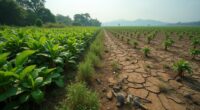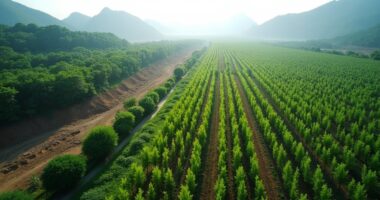The Sembrando Vida program, with a hefty $3.4 billion price tag, aimed to tackle poverty while reforesting Mexico. Ironically, instead of blossoming forests, it fostered forest loss—over 72,000 hectares in just one year! Participants often cut down existing trees to qualify for cash payments, leading to a dismal environmental impact. Non-native species were planted, wreaking havoc on local ecosystems. It’s a classic case of “the road to ecological disaster is paved with good intentions.” Curious about the wild ride?
The Paradox of Good Intentions
What happens when a noble idea meets a messy reality?
Enter Sembrando Vida, a Mexican government initiative launched with the intention of alleviating poverty and promoting agroforestry.
The concept seemed golden: provide marginalized farmers with monthly payments—about $250 USD—to plant trees across 2.5 hectares of land.
However, the execution has been anything but smooth.
As of 2023, the program has expanded to 29 states and parts of Central America, racking up over $3.7 billion USD in government spending.
But here’s the twist: instead of flourishing forests, analysis reveals over 72,000 hectares of forest loss in 2019 alone.
The irony is thick.
While the program aims for reforestation and biodiversity conservation, it coincided with significant spikes in deforestation.
In 2021, a whopping 189,000 hectares were lost, much of it in southern Mexico’s communal lands.
Reports suggest that participants felt pressure to clear existing forests just to get their subsidy checks.
It’s like needing to destroy a cake to bake a new one—counterproductive, to say the least.
Funding, which could have bolstered essential environmental protection programs, was diverted into this initiative, leading to a skewed allocation of public resources.
Timber species accounted for 71% of planted areas, often at the expense of native trees.
Imagine asking a chef to prepare a gourmet meal but only providing them with canned ingredients.
That’s how ecological goals were compromised.
Corruption further muddied the waters, with allegations of mismanagement and local leaders taking advantage of land eligibility requirements.
The lack of ecological expertise has led to poor species selection, with non-native trees being planted in unsuitable climates.
Additionally, the program has reached over 442,000 beneficiaries, highlighting its extensive yet problematic reach.
The program fails to incorporate indigenous knowledge that has successfully maintained forest ecosystems for generations.
It’s akin to planting a polar bear in a desert—just doesn’t make sense!
In this tangled web of good intentions gone awry, Sembrando Vida stands as a cautionary tale of how high hopes can sometimes lead to unexpected consequences.
While the initiative aims to empower rural communities, its implementation has resulted in significant environmental degradation.








